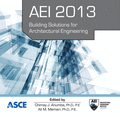Building Science Integrated Systems Methodological Framework
Publication: AEI 2013: Building Solutions for Architectural Engineering
Abstract
Building performance is governed by physical processes, which are dynamically coupled in time and space, and whose degrees of interactions are often difficult to measure and appreciate. As a result, suboptimal performance and failures often occur. The goal of high-performance buildings is to optimize major aspects such as energy efficiency, life-cycle costs, and lighting, which are tightly coupled by the underlying physical processes. The premise behind this research project is that building integration/optimization can only be achieved when grounded on a shared understanding and communication of the underlying physical principles governing building performance, which can then enable the transformation of these principles into meaningful performance metrics. This paper proposes a methodology for building systems integration through building science principles. At the core of the methodology, a vocabulary of building science concepts, principles, and metrics enables using existing knowledge to increase understanding and gain insights on the systems involved in a particular design (including degrees of coupling, redundancies, and behaviours), which in turn facilitates the creation of new knowledge that may be needed to integrate new systems and technologies. A set of generic building science rules implemented using systems theory will enable such knowledge creation while preserving systems integrity at all times. The goal of this research is not to create a knowledge-base to replace building science professionals but to leverage an explicit vocabulary to increase understanding, learning, and communication of building performance for improved building integration. Furthermore, it is envisioned that the knowledge-base will serve as a bridge between building simulation, decision analysis, and optimization. This paper presents the initial attempt to organize a wealth of building science knowledge into a structured vocabulary. The power of generality and usability of the methodology will be tested with a case study. The expected benefits of the approach are three-fold: 1) to promote a more systematic approach to optimize building systems, 2) to facilitate the integration of new systems and technologies in buildings, and 3) to improve the education and dissemination of building science knowledge for improved building integration.
Get full access to this chapter
View all available purchase options and get full access to this chapter.
Information & Authors
Information
Published In
Copyright
© 2013 American Society of Civil Engineers.
History
Published online: Apr 26, 2013
Authors
Metrics & Citations
Metrics
Citations
Download citation
If you have the appropriate software installed, you can download article citation data to the citation manager of your choice. Simply select your manager software from the list below and click Download.
